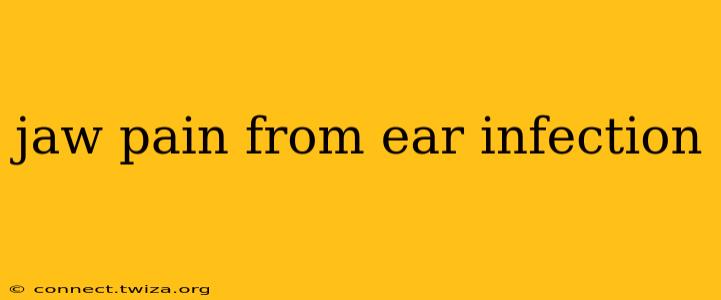Ear infections, while commonly associated with earache, can sometimes cause surprising symptoms like jaw pain. This isn't always directly caused by the infection itself within the ear, but rather by the body's response to the infection and its proximity to the jaw joint. Understanding this connection is crucial for effective treatment and pain management. This comprehensive guide explores the link between ear infections and jaw pain, providing insights into potential causes, effective treatments, and when to seek professional medical help.
Why Does an Ear Infection Cause Jaw Pain?
The intricate anatomy of the head and neck plays a significant role. The temporomandibular joint (TMJ), which connects your jaw to your skull, is located very close to the ear. Inflammation from an ear infection, whether it's otitis media (middle ear infection) or otitis externa (outer ear infection), can sometimes spread or trigger referred pain in the nearby TMJ. This referred pain feels like it originates in the jaw, even though the primary source of the problem is the ear.
Furthermore, the intricate network of nerves in this region can contribute to the pain referral. Nerves responsible for sensation in the ear and jaw often share pathways. Therefore, signals from the inflamed ear can be misinterpreted by the brain as originating from the jaw, resulting in jaw pain.
What are the symptoms of an ear infection that might cause jaw pain?
Symptoms of an ear infection vary but commonly include earache, feeling of fullness in the ear, hearing loss, fever, and sometimes drainage from the ear. The jaw pain associated with ear infections is often dull, aching, and can worsen with chewing or jaw movements. It’s crucial to note that the jaw pain might be the only symptom some individuals experience, leading to misdiagnosis.
Can an ear infection cause TMJ pain?
While an ear infection doesn't directly cause TMJ disorder (TMD), the inflammation associated with an ear infection can exacerbate pre-existing TMD or trigger TMJ pain in susceptible individuals. The close proximity and shared nerve pathways make this connection plausible. If you have a history of TMJ problems, an ear infection could significantly worsen your symptoms.
How is jaw pain from an ear infection treated?
Treatment focuses primarily on addressing the underlying ear infection. This often involves antibiotics prescribed by a doctor to combat bacterial infections. Pain relievers, such as ibuprofen or acetaminophen, can help manage both earache and jaw pain. Applying warm compresses to the affected ear may also provide some relief. In some cases, a doctor may recommend decongestants to reduce swelling and pressure in the ear.
When should I seek medical attention for jaw pain related to an ear infection?
You should consult a doctor if you experience severe jaw pain, particularly if accompanied by other symptoms such as high fever, severe ear pain, dizziness, or facial swelling. Prompt medical attention is crucial to ensure proper diagnosis and treatment of the underlying ear infection, preventing potential complications. Delaying treatment can lead to more severe infections and potential complications impacting hearing and overall health.
Are there any home remedies for jaw pain associated with an ear infection?
While home remedies can offer temporary relief from mild discomfort, they should not replace professional medical care. Gentle massage around the jawline can help alleviate tension, and warm compresses on the ear can ease pain and inflammation. However, it is vital to address the underlying ear infection with appropriate medical treatment.
How can I prevent ear infections?
Practicing good hygiene, such as regularly cleaning the ears gently, can help prevent outer ear infections. Avoiding exposure to sick individuals can help reduce the risk of acquiring infections. For children, proper breastfeeding and vaccination can significantly reduce the likelihood of middle ear infections.
This information is for educational purposes only and should not be considered medical advice. Always consult a healthcare professional for any health concerns or before making any decisions related to your health or treatment. They can properly diagnose the cause of your jaw pain and recommend the appropriate course of action.
